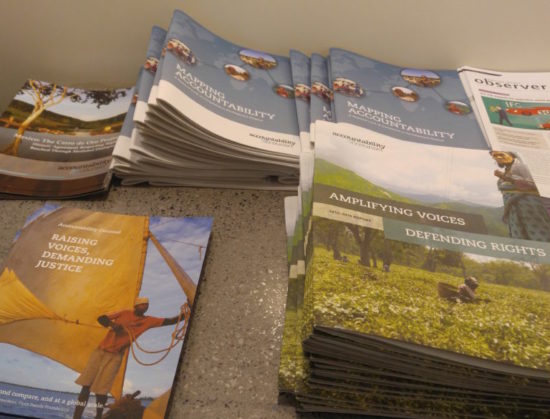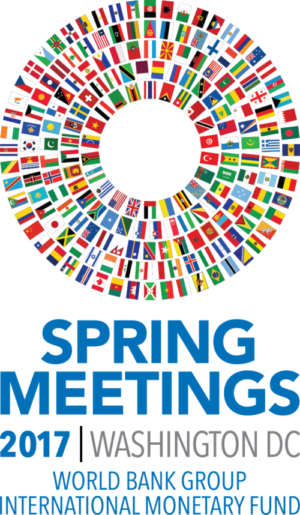Promoting Accountability at the World Bank Spring Meetings

Affected communities. Civil society organizations. World Bank staff and Executive Directors. Governments. Private sector companies. The World Bank Group and International Monetary Fund Spring Meetings, and the accompanying Civil Society Policy Forum (CSPF), are an avenue where all of these actors can get together to discuss pressing issues in international development financing. Accountability Counsel actively participated in this year’s Spring Meetings and CSPF, held in April, and pushed our message that accountability must be a priority for everyone involved in order for development to be effective.
Along with Ambiente y Sociedad, the Center for International and Environmental Law (CIEL), Derecho Ambiente y Recursos Naturales (DAR), Fundar, FUNDEPS, and Grupo Regional sobre Financiamiento e Infraestructura (GREFI), we co-hosted a session on strengthening the role of independent accountability mechanisms (IAMs) in Latin America. Carmen Balaguera Reyes, from the Comité para la Defensa del Agua y el Páramo de Santurbán in Colombia, discussed her community’s complaint at the Compliance Advisor Ombudsman (CAO), filed to protect their water source and environment from an International Finance Corporation (IFC) financed mining project in Colombia’s Santander region. Jamner Manihuar, from the Asociación Interétnica de Desarrollo de la Selva Peruana (AIDESEP), discussed his organization’s experience with the dispute resolution process of the Inter-American Development Bank’s (IDB) Independent Consultation and Investigation Mechanism (MICI) concerning an IDB land-titling project in the Peruvian Amazon. With participation from the CAO’s Maree Newson and MICI’s Victoria Marquez Mees, the session highlighted the role that accountability mechanisms can play in addressing harms from development projects, as well as the challenges that communities can face when filing complaints to these mechanisms in their search for remedy.
 Other highlights from the week included sessions hosted by the IAMs. The Inspection Panel, the World Bank’s accountability mechanism, presented the third report in their Emerging Lessons series, Environmental Assessment. The series looks back on the Panel’s caseload and identifies key lessons for the improvement of bank operations and the sustainability of bank-funded projects. The session outlined that of the 34 investigations that the Panel has conducted thus far, 29 have involved problems with environmental assessment, signaling the importance of ensuring that environmental assessments are done properly and that impacts are continually monitored. As one panelist put it, and as Accountability Counsel has seen in several of our cases, there is no substitute for proactive and independent monitoring of projects.
Other highlights from the week included sessions hosted by the IAMs. The Inspection Panel, the World Bank’s accountability mechanism, presented the third report in their Emerging Lessons series, Environmental Assessment. The series looks back on the Panel’s caseload and identifies key lessons for the improvement of bank operations and the sustainability of bank-funded projects. The session outlined that of the 34 investigations that the Panel has conducted thus far, 29 have involved problems with environmental assessment, signaling the importance of ensuring that environmental assessments are done properly and that impacts are continually monitored. As one panelist put it, and as Accountability Counsel has seen in several of our cases, there is no substitute for proactive and independent monitoring of projects.
The CAO hosted a session on the principles and practice of mediation in a local and global context. The session, which included several dispute resolution experts, underscored the potential benefits and challenges of dispute resolution to bring clarity and justice to projects financed by the IFC and other development finance institutions (DFIs). The session tackled difficult questions that are at the heart of our work, such as how to ensure an equitable dispute resolution process between parties with vastly different degrees of power. Accountability Counsel’s role accompanying communities through these processes can help to even the playing field, but we believe that accountability offices also have a responsibility to provide an equitable process for all complainants, regardless of their level of education or resources.
In addition to the sessions, we were able to catch up and engage with our civil society partners from around the world, including several International Advocates Working Group (IAWG) members, to share IAM case updates and discuss our advocacy to promote accountability for harms caused by development projects. We also met with World Bank management to discuss our concerns about the World Bank Group’s commitment to safeguards in light of its new emphasis on scaling private capital for development projects. Additionally, we discussed incentives for World Bank staff to ensure that safeguards are properly enforced. We look forward to engaging more with the Bank to guarantee that communities are properly protected from adverse impacts.
Informed by our community-centered approach, Accountability Counsel is committed to advocacy toward other DFIs and private sector actors to secure accountability and remedy for those harmed by development activities. Stay tuned for future blogs on our advocacy at DFI annual meetings!

